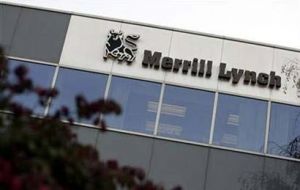MercoPress. South Atlantic News Agency
KO Merrill Lynch rescued by Kuwait, Korea, Saudi & others
 Merrill Lynch losses hit Wall St.
Merrill Lynch losses hit Wall St. Wall Street banking giant Merrill Lynch unveiled on Thursday a huge net loss of 7.8 billion US dollars for 2007, compared to a net profit of 7.5 billion in 2006. The loss includes a massive 14.1 billion write-down on failed investments related to sub-prime mortgages.
Merrill Lynch is the latest big bank to reveal losses related to the crisis in the US mortgage market. Earlier this week, Citigroup and JP Morgan also announced write-downs because of their exposure to the crisis in the sub-prime loan sector, which focused on consumers with poor or non-existent credit histories. JP Morgan Chase said its earnings for the last three months of 2007 fell 34%, while Citigroup reported a 9.83 billion net loss for the last three months of 2007. Other banks also exposed losses: Wells Fargo & Co said its fourth-quarter profit fell 38%, the first decline in more than six years, hurt by rising losses from home equity loans. But the decline at the San Francisco-based bank was smaller than expected. More dramatically, bond insurer Ambac Financial Inc slashed its quarterly dividend, announced plans to raise one billion US dollars of new capital and named an interim chief executive as it scrambled to maintain triple-A credit ratings. Ambac which expects to report a hefty fourth-quarter loss next week slashed the estimated value of its credit derivative portfolio by 5.4 billion US dollar. Its shares plunged 20%. In the last three months of 2007 alone, Merrill chalked up losses of 9.83 billion, the biggest quarterly loss in its history. The previous chief executive, Stan O'Neal, stepped down in October because of the bank's poor performance. New boss John Thain said while the firm's performance was "clearly unacceptable" Merrill had been able to strengthen its balance sheet over the last few weeks. "I don't think you should anticipate any further problems of this magnitude," Mr Thain said. "There would have to be something incredibly bad out there to have this happen again, and our whole goal is to get 2007 behind us". Mr Thain is the former president of Goldman Sachs, one of the few Wall Street firms to have so far come through the sub-prime crisis largely unscathed. Actually Merrill survived because it received fresh backing totaling 6.6 billion US dollars from the Kuwait Investment Authority, the Korean Investment Corporation, a private Saudi Arabian fund and other investors. Rivals Citigroup, UBS and Morgan Stanley have raised capital from similar sources. But damage this week was not contained to the United States. Japan's largest bank, Mitsubishi UFJ Financial Group Inc, may have lost as much as 50 billion yen (471 million US dollars) on subprime investments last year, up from the 4 billion yen it reported for the six months to September, according to executives with direct knowledge of the matter. Shares in Japan's big banks, which have ridden the credit crisis relatively unscathed so far, fell sharply in response. "Sentiment is bad because no one knows if there will be further losses," said Koichi Ogawa, chief portfolio manager at Daiwa SB Investments. Banks are struggling to calculate how much their investment in assets backed by sub-prime mortgages are actually worth, which is why they are reporting massive write-downs. During the US housing boom, the sub-prime market expanded significantly. But a series of US interest rate rises over two years meant many sub-prime borrowers could no longer afford their monthly payments, causing them to default on loans. Banks had packaged up these loans into financial instruments known as "collateralized debt obligations" and sold them on to investors. Demand for CDOs dried up as the scale of defaults emerged, leaving banks nursing huge losses. Merrill was among the largest creators of such securities. The Government of Singapore Investment Corp, Singapore's biggest sovereign wealth fund, said this week that its large investment in Citigroup and 9.75 billion US dollars injection into credit-hit Swiss Bank UBS AG were unique at a time of financial turmoil and did not represent a strategy shift. European banks have not escaped the credit crunch, which bit in August when banks realized they did not know which among them were dangerously exposed to the US subprime meltdown and stopped lending to each other. Shares in Britain's Northern Rock Plc crashed over 20% to a record low as expectations mounted that the stricken British mortgage bank, which was forced to borrow around 26 billion pounds from the Bank of England as the credit crunch bit, will be brought under state control. The interbank cost of borrowing euros, dollars and sterling fell again, with three-month Euro rates posting the biggest daily drop so far this year, following concerted central bank action to provide funds in the past month. But most experts say ongoing losses at major banks mean the crisis is far from over as crucial lending between commercial banks remains patchy at best. Main subprime losses so far: Merrill Lynch, 22.1 billion US dollars; Citigroup, 18 billion; UBS, 13.5 billion; Morgan Stanley, 9.4 billion; HSBC, 3.4 billion; Bear Stearns, 3.2 billion; Deutsche Bank, 3,2 billion; Bank of America, 3 billion; Barclays, 2.6 billion; Royal Bank of Scotland, 2.6 billion; Freddie Mac, 2 billion; JP Morgan Chase, 3.2 billion; IKB, 2.6 billion; Credit Suisse, 1 billion; Wachovia, 1.1 billion; Paribas, 197 million US dollars.




Top Comments
Disclaimer & comment rulesCommenting for this story is now closed.
If you have a Facebook account, become a fan and comment on our Facebook Page!